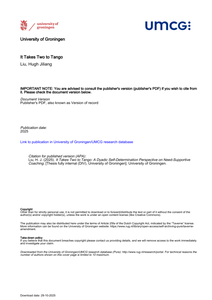The impact of organized youth sport on youth development depends on various conditions in the pedagogical climate, such as how sport is delivered by youth sport coaches. While this is broadly acknowledged and provides a basis to improve youth sport and its developmental outcomes, little is known about the pedagogical perspectives of youth coaches on their practice. This study uses semi-structured interviews with 32 youth sport coaches in diverse youth sport contexts in the Netherlands. Reflexive data analysis is employed to garner insights into coaches’ role perceptions, coaching goals, and underlying values. The findings show that while youth coaches focus on sport-centered activities, many foreground non-sport dimensions such as life mentoring and working towards social inclusion as critical elements of their work, reflected in five pedagogically-oriented goals: discipline, autonomy, resilience, social abilities, and aspirations. Underlying these goals are pedagogical values such as building and maintaining caring relationships with participants. These goals and values echo scientific literature on pedagogical sport climate conditions (e.g. positive youth development), and challenge notions of youth sport as a performance-oriented and uncaring setting. The results contribute to existing knowledge about youth coaches’ pedagogical orientations, and inform the development of strategies to stimulate positive sport practices and developmental outcomes for participants.
DOCUMENT

Just what and how eight experienced teachers in four coaching dyads learned during a 1-year reciprocal peer coaching trajectory was examined in the present study. The learning processes were mapped by providing a detailed description of reported learning activities, reported learning outcomes, and the relations between these two. The sequences of learning activities associated with a particular type of learning outcome were next selected, coded, and analyzed using a variety of quantitative methods. The different activity sequences undertaken by the teachers during a reciprocal peer coaching trajectory were found to trigger different aspects of their professional development.
DOCUMENT

Acknowledging the knowledge gaps and novel paradigms outlined above within both coaching research and practice, the PhD research aims to investigate how need-supportive coaching—rooted in Self-Determination Theory (SDT)—effectively fulfils the satisfaction of beginning teachers’ basic psychological needs (BPNs) and autonomous motivation in pursuing their coaching goals within dyadic coaching relationships. To systematically explore this overarching objective, this PhD project and thesis adopt a structured, four-step approach, where each step investigates specific and complementary aspects of the coaching process. Collectively, these steps provide a comprehensive examination of how and under what conditions BPN-supportive coaching facilitates optimal motivational outcomes, enriching our understanding of the dynamic processes that shape coaching effectiveness among beginning teachers. Specifically, four research questions systematically guide the four research steps:1. What is the current state of empirical evidence linking BPN support, BPN satisfaction, and autonomous motivation within coach-coachee relationships?2. How do perceptual distances between coaches’ and coachees’ perceptions regarding BPN support relate to the coachees’ BPN satisfaction?3. How do coaches’ and coachees’ BPN satisfaction mutually predict autonomous motivation toward shared goals in their dyadic relationships?4. How do coaches and coachees dynamically co-regulate BPN interactions in real-time dyadic coaching conversations?Chapter 1 outlined a four-step empirical approach across Chapters 2 to 5 to understand BPN-supportive coaching. Chapter 2 meta-analysed the extant literature guided by a circular framework connecting BPN support, BPN satisfaction, and autonomous motivation for both parties. The results revealed that previous studies predominantly used individual-level data, neglecting the dynamic, reciprocal interactions in coaching. Chapter 3 investigated perceptual distance between coaches and coachees regarding BPN support using polynomial regression and response surface analysis. Results indicated that coachees reported greater BPN satisfaction when perceptions were closely aligned. Chapter 4 adopted the Actor-Partner Interdependence Model to examine how both parties’ BPN satisfaction is associated with their own and each other’s autonomous motivation. We found a positive unidirectional association between coachees’ relatedness satisfaction and coaches’ autonomous motivation and bidirectional associations for autonomy satisfaction. Chapter 5 employed State Space Grid analyses to capture the moment-to-moment co-regulation of autonomy in coach-coachee dyads. Results revealed recurrent patterns of predominant functional co-regulation (e.g., autonomy support met with proactive autonomy expression), and occasional dysfunctional co-regulation (e.g., evaluative feedback met with disengagement). Temporal evolvement in autonomy co-regulation was identified across coaching sessions in response to changing goals. Chapter 6 synthesised the contributions of the thesis. Collectively, BPN-supportive coaching can be viewed as a context-sensitive, interdependent, co-regulatory, and dynamic process, and we provided guidance for adaptive and relationally grounded coaching practices.
DOCUMENT

The German-Dutch project "Young Maritime Talents" aims to inspire young people for the maritime industry and prepare them for the professional demands of the future. The goal of the consortium, consisting of ten partners and numerous associated partners on both sides of the border, is to develop strategies and measures to attract, develop, and retain young talent in the industry. This will be achieved in particular by strengthening maritime career orientation, actively facilitating suitable practical contacts, and promoting relevant future skills. The broad spectrum of perspectives and competencies of the project partners offers great potential for this. The participation of innovative companies from shipping, shipbuilding, and the port and offshore industries ensures comprehensive industry coverage.The project is aimed at all stakeholders in the field of (pre-) professional orientation and the career entry phase, i.e., from school through training or university studies to the company: from Young Maritime Talent to Young Maritime Professional.The core content of the project is a cross-border structural analysis of career orientation and the transition from school to work, as well as the development of a matching system to precisely match prospective career seekers with opportunities offered by maritime employers. Furthermore, target group-specific materials and formats are being developed to support schools and maritime companies in implementing practical programs for students and career starters. These include simulation games and various events for exchange and mutual coaching among the participating stakeholders. With these measures, the project contributes to making the maritime labour market in the German-Dutch border region more effective, inclusive, and sustainable, and to improving access to high-quality training and jobs.